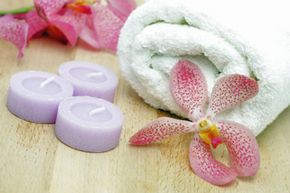When a guest walks in your home, what do you think the first thing they notice is? Your lovely sideboard? The amazing foyer? The pristine hardwood flooring? Unfortunately, these details don't matter if your house smells like wet dog and moldy air. Smell is a very powerful sense, and it can override your other four senses if something foul wafts your way. How your home smells can leave a big impression, so your home's scent is just as important as its appearance. Plus, you have to live there.
If you're striving for a pleasant smell, you have a lot of choices. Some people prefer citrus scents, others go for incense and patchouli. Vanilla is believed to have a calming effect, and, in fact, market research companies have named vanilla as the most popular choice among air freshener consumers. Lavender is a wonderful floral scent to use, or if you prefer something a little more fresh, lemon or orange are great choices. Where you live may also have a bearing on your home's scent. Citrus can be associated with areas that get a lot of sun and breezy weather, or when we think of a cold-weather mountain cabin, earthier scents like pine come to mind.
Advertisement
In Victorian times, floriography, better known as the language of flowers, was used to express feelings of love for those who weren't gifted with the quill and scroll. The flowers were carefully picked, each one having a distinct message that it relayed to the recipient. A gerbera daisy meant cheer up, a sunflower stood for congratulations, and a lily said you're a dear friend. If you want to convey a message to your guests old-world style, you can find extensive lists of flowers and their meanings on the Internet. If you want to be a bit more creative, you can craft your own welcoming scent.

